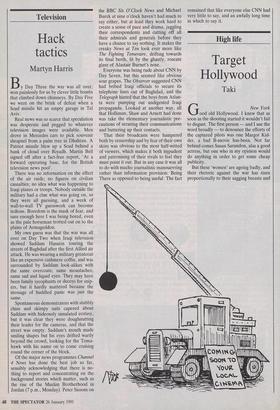Television
Hack tactics
Martyn Harris
By Day Three the war was all over, won painlessly for us by clever little bombs that climbed down chimneys. By Day Five we were on the brink of defeat when a Scud missile hit an empty garage in Tel Aviv.
Real news was so scarce that speculation was desperate and pegged to whatever television images were available. Men drove in Mercedes cars to pick souvenir shrapnel from a palm tree in Dhahran. A Patriot missile blew up a Scud behind a bank of cloud over Riyadh. Martin Bell signed off after a fact-free report, 'At a forward operating base, for the British television news pool'.
There was no information on the effect of the air raids; no figures on civilian casualties; no idea what was happening to Iraqi planes or troops. Nobody outside the military had a clue what was going on, so they were all guessing, and a week of wall-to-wall TV guesswork can become tedious. Boredom is the mask of fear, and sure enough here I was being bored, even as the pale horseman trotted out on to the plains of Armageddon.
My own guess was that the war was all over on Day Two when Iraqi television showed Saddam Hussein touring the streets of Baghdad after the first Allied air attack. He was wearing a military greatcoat like an expensive cashmere coffin, and was surrounded by Saddam look-alikes with the same overcoats; same moustaches; same sad and liquid eyes. They may have been family sycophants or decoys for snip- ers, but it hardly mattered because the message of huddled panic was just the same.
Spontaneous demonstrators with stubbly chins and skimpy suits capered about Saddam with hideously simulated ecstasy, but it was clear they were doughnutting their leader for the cameras, and that the street was empty. Saddam's mouth made smiling shapes but his eyes drifted warily beyond the crowd, looking for the Toma- hawk with his name on to come cruising round the corner of the block.
Of the major news programmes Channel 4 News has done the best job so far, sensibly acknowledging that there is no- thing to report and concentrating on the background stories which matter, such as the rise of the Muslim Brotherhood in Jordan (7 p.m., Monday). Peter Sissons on the BBC Six O'Clock News and Michael Buerk at nine o'clock haven't had much to say either, but at least they work hard to create a sense of pace and drama, juggling their correspondents and cutting off all their admirals and generals before they have a chance to say nothing. It makes the creaky News at Ten look ever more like The Fighting Temeraire, drifting towards its final berth, lit by the ghastly, roseate glare of Alastair Burnet's nose.
Everyone was being rude about CNN by Day Seven, but this seemed like obvious sour grapes. The Observer suggested CNN had bribed Iraqi officials to secure its telephone lines out of Baghdad, and the Telegraph hinted that the boys from Atlan- ta were pumping out undigested Iraqi propaganda. Looked at another way, all that Holliman, Shaw and Arnett had done was take the elementary journalistic pre- cautions of securing their communications and buttering up their contacts.
That their broadcasts were hampered both by censorship and by fear of their own skins was obvious to the most half-witted of viewers, which makes it both inwudent and patronising of their rivals to feel they must point it out. But in any case it was all to do with macho journalistic manouevring rather than information provision: Being There as opposed to being useful. The fact remained that like everyone else CNN had very little to say, and an awfully long time in which to say it.


























































 Previous page
Previous page